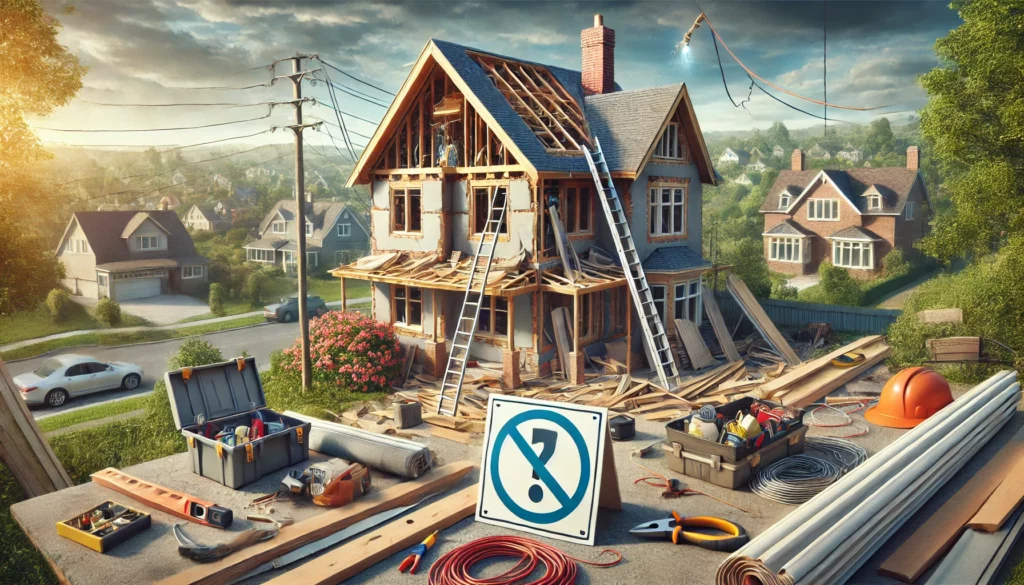What Is Unpermitted Work and How Does It Affect Home Sales?

Introduction
If you’re here, you’re likely grappling with the idea of selling a house that has unpermitted work done to it. Whether you’re the seller or a buyer, you’re probably wondering how these issues will affect the sale process. You’ve likely encountered terms like “unpermitted work” and “house sale complications” and are searching for clarity. Can you still sell a house with unpermitted work? Will it impact your sale price or the speed of the transaction? These are common concerns for anyone dealing with a property that has changes or renovations that didn’t go through the required permits or inspections.
For sellers, especially those facing time constraints or looking to avoid costly repairs, unpermitted work can be a significant hurdle. For buyers, it’s about making sure that they aren’t investing in a property with legal or financial red flags. The goal of this blog is to provide you with a comprehensive understanding of how unpermitted work impacts home sales and the best ways to navigate the situation. By the end of this blog, you’ll know exactly what steps to take to move forward, either by fixing the issues or by choosing the most strategic way to sell—perhaps even for cash.
What Is Unpermitted Work and Why Does It Matter?
Unpermitted work refers to any construction, renovation, or repair done on a property without obtaining the necessary permits or following local building codes. It’s a situation where homeowners bypass the formal approval process, often due to time or cost considerations. While some minor work may not require a permit, major alterations such as room additions, electrical work, or plumbing changes typically do.
Why does this matter? Unpermitted work can be problematic for both sellers and buyers. From a seller’s perspective, unpermitted work can complicate the sale process, create delays, and even decrease the property’s value. Buyers may be hesitant to purchase a home with unpermitted work because it can signal potential legal and safety issues, making them wary of investing in the property.
When selling a home, you may be legally required to disclose unpermitted work. If this is not disclosed, it can lead to serious legal consequences down the line. For this reason, it’s essential to understand how unpermitted work can affect the sale of your home and whether selling as-is or addressing the issue is a better strategy.
Impact on Home Sales
According to data from real estate professionals, homes with unpermitted work can face price reductions ranging from 5% to 25%, depending on the scale of the unpermitted changes. While this can vary by region, the general consensus is that buyers tend to offer lower prices when faced with unpermitted work. In some extreme cases, the property may struggle to sell at all, especially in areas with stringent building codes.
How Unpermitted Work Affects Property Value
When it comes to selling a home with unpermitted work, one of the most significant concerns is its potential impact on the property’s value. Real estate appraisers and inspectors consider the quality and legality of renovations when determining a home’s worth. Unpermitted work can cause a significant reduction in property value for a variety of reasons.
The Risk of Financial Penalties
A major concern with unpermitted work is the risk of financial penalties. If the property is sold and the unpermitted work is discovered later, the new owner may face fines or be required to remove the work altogether. For instance, if a room addition was done without a permit, the new owner could be forced to tear down the addition and restore the property to its original state, incurring substantial costs.
In some cases, the city or county may assess fines for work that was completed without proper permits. These fines can range from a few hundred to several thousand dollars, depending on the extent of the work and the local laws. This adds to the financial burden on the buyer, which in turn can make them reluctant to offer the asking price.
Reduced Appeal for Buyers
Another significant factor is the reduced appeal to buyers. Many buyers are hesitant to purchase a property that has unpermitted work because of the uncertainty surrounding the quality and safety of the renovations. They may worry about structural issues, electrical hazards, or plumbing problems. Even if the unpermitted work appears to be done well, buyers often hesitate to take on the potential risk of unapproved changes.
In fact, homes with unpermitted work may spend longer on the market compared to those with all necessary permits. The property may need to be discounted in order to sell. Sellers who choose to sell a home with unpermitted work often face a trade-off: accept a lower price or deal with the inconvenience of having to fix the issues.
How Can Unpermitted Work Affect Financing?

Most traditional lenders, including banks and mortgage companies, are reluctant to finance properties with unpermitted work. Why? Because unpermitted work can lead to major risks for the lender, including safety hazards, uninsurable issues, and the possibility that the work violates building codes.
If you’re planning to sell a property with unpermitted work, it’s crucial to consider how this will affect the potential buyers. Most buyers who rely on conventional financing will find it difficult to obtain a mortgage for a home with unpermitted work. This reduces the pool of buyers and can lead to a longer sales process.
However, cash buyers typically don’t require financing and are less concerned about unpermitted work. This makes selling to a cash buyer an attractive option if you want to avoid the complexities of traditional financing.
Cash Buyers Are an Option
For sellers with unpermitted work, one solution may be selling to a cash buyer who is less concerned about permits and legalities. Cash buyers often purchase homes as-is and are willing to take on the risks associated with unpermitted work in exchange for a quick sale. This is why many sellers opt for cash buyers when facing unpermitted work issues. To learn more about how cash sales can work for your property, visit How to Sell a House for Cash with Unpermitted Work.
Should You Fix Unpermitted Work Before Selling?
One of the most common questions sellers have is whether they should fix unpermitted work before listing their home for sale. While the decision largely depends on the scope of the unpermitted work, there are some key factors to consider when deciding whether to repair the work.
The Cost of Permitting and Repairs
Repairing unpermitted work and obtaining permits can be costly. For example, if you added a room or finished your basement without a permit, you may need to pay for inspections, permits, and even the cost of undoing some of the work if it doesn’t meet code. In some cases, repairs can run into the thousands of dollars. You’ll need to weigh the cost of these repairs against the potential increase in sale price.
For some sellers, it may be more practical to sell the home as-is, especially if the unpermitted work is minor or if they’re in a time crunch. Fixing the work may delay the sale and add unnecessary expenses. For others, making the repairs could increase the sale price and reduce the risk of negotiations.
Get more insight into the cost of home repairs and renovation from Angie’s List.
How to Sell a House With Unpermitted Work
If you’ve decided to sell your house with unpermitted work, you have several options to consider. First and foremost, it’s essential to disclose any unpermitted work to potential buyers. Failure to do so can result in legal issues after the sale.
One option is to sell to a cash buyer, which we discussed earlier. Cash buyers are often willing to take on the risks associated with unpermitted work, as they are typically investors who buy homes as-is.
Another option is to offer the property at a discounted price to account for the unpermitted work. This may help attract buyers who are willing to take on the project themselves, but it could result in a longer sales process.
Conclusion: Why Selling for Cash with Local Home Buyer Might Be the Best Option
In conclusion, unpermitted work can certainly complicate the sale of a home, but it doesn’t have to be a deal-breaker. Understanding the potential challenges—such as reduced property value, the difficulty in securing financing, and hesitant buyers—can help you make the right decision for your situation.
Selling your home for cash is often the most straightforward solution when dealing with unpermitted work. By choosing Local Home Buyer, you can avoid the hassle of dealing with repairs, permits, and the uncertainty of traditional buyers. Cash buyers, like us, are willing to purchase homes as-is, regardless of any unpermitted work. This means you can sell your property quickly, without having to worry about negotiating prices or spending money on costly repairs.
If you’re looking for a fast, hassle-free sale, Local Home Buyer can provide you with a fair cash offer and close on your timeline. Skip the stress and uncertainty of a traditional sale and sell your home on your terms with us. Contact Local Home Buyer today to get started!
